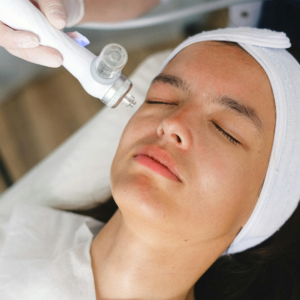
Why Winter Is the Ideal Season for Peels, Lasers, and CO₂ Treatments
Winter is the ideal time for peels, lasers, and CO₂ treatments with less sun exposure, smoother recovery, and better skin results.
Shannon Del Grande is now seeing patients in our Wayne/Chesterbrook office.
Did you know that individuals with acne have an 18.5% risk of developing major depressive disorder, compared to 12.0% in the general population? This statistic reveals a hidden truth: acne is more than a skin-deep issue. While acne is often associated with adolescence, affecting approximately 85% of people between the ages of 12 and 24, it’s not limited to this age group. In fact, adult acne is on the rise, with up to 15% of women experiencing acne in their 30s and 40s. For many of these individuals, their struggle with acne goes beyond mirror reflections. It’s a daily battle that can profoundly impact mental health and overall quality of life.
In an era where social media amplifies appearance-based pressures, the psychological burden of acne can be particularly heavy. At Bryn Mawr Dermatology, we’re committed to unraveling the complex relationship between acne and mental health. In this article, we’ll explore how acne affects the mind, how the mind influences skin health, and the transformative power of effective treatment.
While this article spells out some important information about the mental health of acne, we highly recommend you read the full article, here are the key points we will focus on:
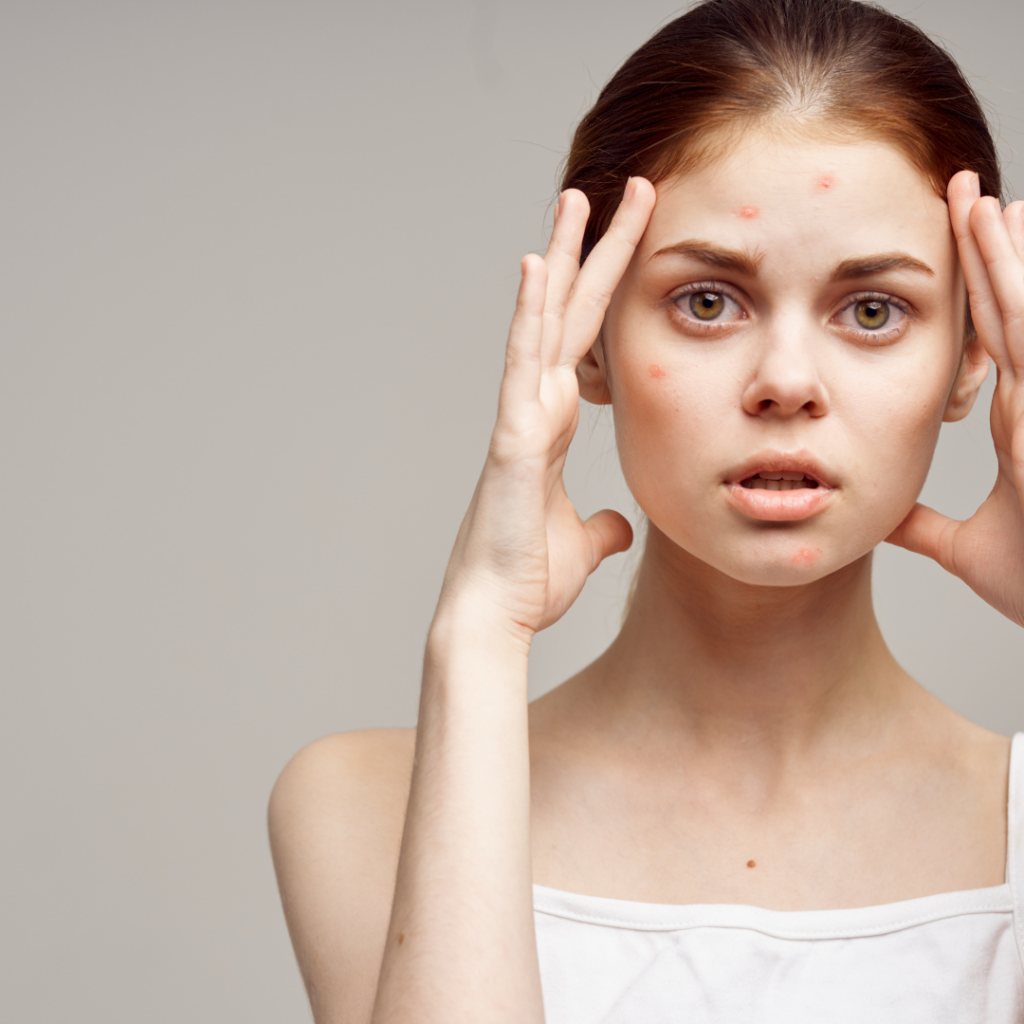
The connection between our mental state and skin health is complex. When we experience psychological stress, our body releases hormones such as cortisol. These can trigger increased oil production, resulting in clogged pores and acne breakouts. Chronic stress can also cause systemic inflammation, potentially worsening inflammatory skin conditions.
Anxiety and depression can impair the skin’s protective barrier, making it more vulnerable to irritants and bacteria. This can lead to increased skin sensitivity and slower healing of acne lesions. Additionally, those dealing with mental health issues may be more likely to engage in behaviors that worsen acne, such as skin picking or neglecting skincare routines.
However, the relationship between mental health conditions and acne is reciprocal. While anxiety and depression can worsen acne, the presence of acne itself can also significantly impact an individual’s mental well-being. This two-way interaction creates a cycle that requires a comprehensive treatment approach, addressing skin health and emotional wellness.
Acne affects more than just appearance; it can significantly alter how individuals perceive themselves and interact with the world around them. One of the most overlooked aspects of acne’s mental health impact is its effect on daily functioning. Many individuals with acne report changes in their behavior, from avoiding social situations to altering their career choices.
In today’s world, one reason for this is social media and cyberbullying. The constant exposure to potential criticism online can lead to increased anxiety, depression, and social isolation. Furthermore, the rise of video conferencing and selfie culture has intensified the focus on appearance, potentially amplifying the psychological distress experienced by those with acne. Many individuals report spending hours each day trying to conceal their acne for online interactions, leading to increased stress and decreased productivity.
Lowered self-esteem and negative self-talk aren’t just limited to teenagers; adults with acne often face unique challenges, feeling they should have “outgrown” the condition. This can lead to shame and feelings of inadequacy, particularly in professional settings. Interestingly, the severity of acne doesn’t always correlate with its psychological impact. Some individuals with mild acne may experience significant distress, while others with more severe cases may be less affected. This highlights the importance of addressing each patient’s mental health individually rather than assuming based on physical appearance alone.
Effectively treating and controlling acne can significantly improve both skin health and mental well-being. Here are several ways that managing acne can positively impact mental health:
Isotretinoin (Accutane) can be a highly effective treatment option for severe or persistent acne. Recent studies have shown that isotretinoin not only treats acne effectively but also has a positive effect on mood. While previously thought to have potential mental health risks, the current consensus among dermatologists is that as acne improves with isotretinoin treatment, patients often experience significant improvements in their mental health as well. In fact, reports of suicide were found to be more frequent among individuals with acne who have not received isotretinoin treatment compared to those who have been treated with it.
Recognizing when to consult a dermatologist is crucial for your skin health and mental well-being. Here are key indicators that it’s time to seek professional care:
Don’t hesitate to contact a healthcare professional if you’re concerned about your acne. Early intervention can significantly improve your skin health and quality of life.
At BMD, our approach to acne treatment is as multifaceted as the condition. We offer comprehensive solutions tailored to each patient’s unique needs, from advanced treatment plans to innovative technologies like light therapy and laser skin resurfacing.
What sets us apart is our dedication to treating the whole person. We don’t just focus on clearing your skin; we aim to boost your confidence and improve your overall quality of life. Our experienced dermatologists create personalized strategies that address your specific type of acne, skin concerns, and lifestyle factors while also providing support for the psychological impact of acne. Ready to take control of your acne and rediscover your confidence? Schedule a consultation with our team today by calling 610-525-7800. At Bryn Mawr Dermatology, we’re here to help you achieve the clear, healthy skin you deserve!

Winter is the ideal time for peels, lasers, and CO₂ treatments with less sun exposure, smoother recovery, and better skin results.
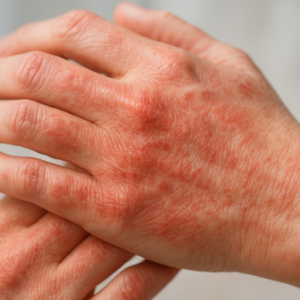
Learn how to prevent and treat winter skin flare-ups with expert tips on hydration, skincare routines, and in-office treatments.
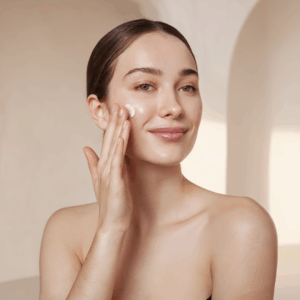
Healthy Skin Month is here! Discover how to protect your skin this winter and book your skincare consultation today!
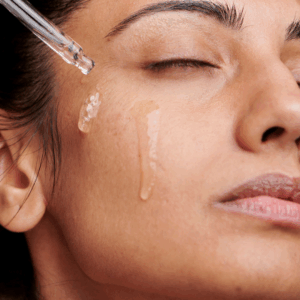
Celebrate Skincare Awareness Month by making your skin health a top priority. Discover expert tips and book your appointment today!
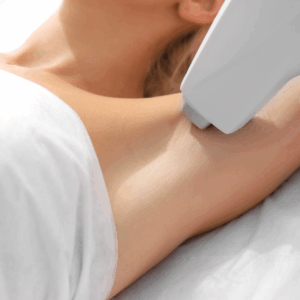
Do you want to fade acne scars, smooth wrinkles, or remove unwanted hair? Learn how laser skin treatments can help!

Give your skin a much-needed reset this back-to-school season. Book your full-body skin check with Bryn Mawr Dermatology today.

By: Bryn Mawr Dermatology, Published: September 4, 2024
Medically Reviewed By: Christine Stanko, MD, FAAD – September 2, 2024
For COSMETIC APPOINTMENTS:
For MEDICAL APPOINTMENTS: